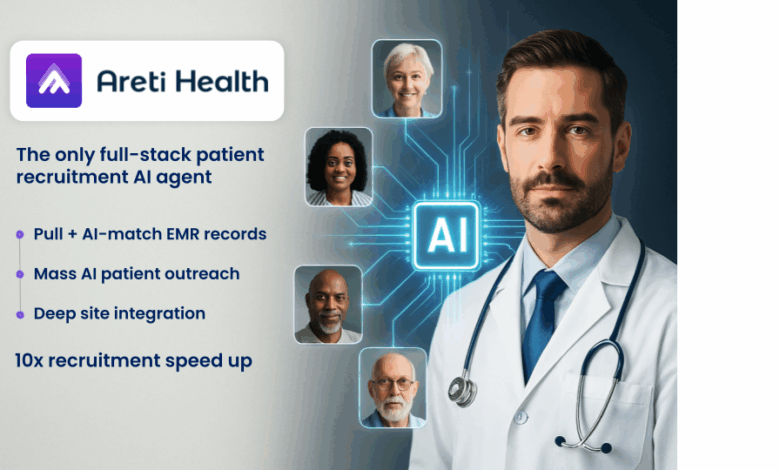
The healthcare industry stands at a pivotal moment. While medical breakthroughs happen at an unprecedented pace, the infrastructure supporting clinical research struggles to keep up with demand. Clinical trials – the backbone of clinical innovation – face a persistent crisis: over 80% fail to meet enrollment timelines, costing the industry $40 billions and delaying life-saving treatments for patients who need them most.
At Areti Health we transform this landscape through the strategic application of generative artificial intelligence. By addressing the fundamental challenges in clinical trial recruitment and patient engagement, we are not just improving operational efficiency – we are accelerating the pace at which new treatments reach patients worldwide.
The Enrollment Challenge
Clinical trial recruitment represents the most significant bottleneck in clinical research today. The statistics paint a sobering picture: 80% of trials fail to meet enrollment targets, and the median delay extends timelines by 6.3 months. Each day of delay can cost pharmaceutical sponsors up to $600,000, translating to $40 billions in lost revenue annually across the industry.
But the true cost extends far beyond financial implications. Every delayed trial means patients with serious conditions wait longer for potentially life-saving treatments. Families dealing with cancer, rare diseases, and chronic conditions face extended uncertainty while researchers struggle to find eligible participants.
Traditional Recruitment Limitations
Conventional clinical trial recruitment methods rely heavily on manual processes that haven’t evolved significantly in decades. Research coordinators spend countless hours reviewing medical records, making phone calls, and manually screening potential participants. This approach creates several critical problems:
Resource Intensivity: Site coordinators, already stretched thin, dedicate 30-40% of their time to recruitment activities rather than patient care and study execution.
Inconsistent Outreach: Manual screening processes lead to missed opportunities, as coordinators may overlook eligible patients buried in complex medical records.
Limited Scalability: Traditional methods cannot efficiently handle the growing complexity of modern clinical trials, which often require highly specific patient populations.
Patient Experience Gaps: Potential participants often receive generic, impersonal outreach that fails to address their specific concerns and motivations.
Areti Health’s AI-Powered Solution: A Paradigm Shift Conversational AI at the Core
Areti Health’s platform centers on sophisticated conversational AI technology that fundamentally reimagines how patients interact with clinical research opportunities. Unlike traditional recruitment methods that rely on one-size-fits-all approaches, Areti’s AI creates personalized, empathetic conversations that resonate with individual patients’ needs and concerns and aligns with study complexity.
The conversational AI system understands context, emotion, and medical complexity in ways that previous automation tools never could. When a patient receives outreach from an Areti-powered system, they’re not getting a robotic script—they’re engaging with an intelligent system that can answer questions, address concerns, and provide relevant information tailored to their specific medical situation.
Seamless EMR Integration
One of Areti Health’s most significant innovations lies in its seamless integration with National Health Exchanges to support health systems in their treatment planning and a view into more than 250 million patient charts. This integration represents a quantum leap beyond traditional patient engagement methods by enabling real-time access to comprehensive patient medical data.
The AI system can analyze vast amounts of medical data instantaneously, verifying candidates based on complex inclusion and exclusion criteria that take human coordinators hours to review manually. This capability transforms patient identification from a time-intensive manual process into an automated, accurate, and comprehensive screening system.
Real-Time Data Processing: The platform queries HIN (a national health information network), verifying eligible patients as their medical status changes or new trials become available.
Complex Criteria Matching: Advanced algorithms can process multifaceted eligibility requirements, considering factors like medication history, lab values, comorbidities, and treatment timelines simultaneously.
Privacy-First Design: All data processing occurs within HIPAA-compliant frameworks, ensuring patient privacy while maximizing recruitment efficiency.
Intelligent Patient Prescreening and Matching
Areti Health’s AI goes beyond simple database searches to provide sophisticated patient matching that considers both explicit criteria and nuanced medical factors. The system can identify patients who meet traditional eligibility requirements while also considering factors like:
Treatment History Patterns: Understanding how a patient’s previous treatments impact trial eligibility, adherence, and likelihood of successful participation.
Geographic Accessibility: Considering travel distance, transportation options, and scheduling flexibility to identify patients most likely to complete study requirements.
Engagement Probability: Analyzing communication preferences and historical healthcare engagement to optimize outreach timing and messaging.
The Technology Behind the Transformation Generative AI Capabilities
Areti Health leverages cutting-edge generative AI technology to create dynamic, contextually appropriate communications for each potential participant. This technology represents a significant advancement over traditional automated messaging systems.
Personalized Communication: The AI generates unique messages that speak directly to each patient’s specific medical situation, concerns, and motivations for participating in research.
Multi-Language Support: Advanced language models enable outreach in patients’ preferred languages, breaking down communication barriers that traditionally limit trial diversity.
Emotional Intelligence: The system recognizes and responds to emotional cues in patient communications, providing empathetic responses that build trust and engagement.
Educational Content Creation: AI generates educational materials that help patients understand their condition, treatment options, and the potential benefits of trial participation.
Machine Learning and Continuous Improvement
The Areti Health platform continuously learns and improves through machine learning algorithms that analyze medical history, recruitment patterns, patient responses, and trial outcomes. This self-improving system means that recruitment effectiveness increases over time as the AI learns from each interaction.
Predictive Analytics: Machine learning models identify patterns that predict which patients are most likely to enroll and successfully complete trials.
Response Optimization: The system learns which communication strategies, timing, and messaging approaches generate the highest patient engagement rates.
Site-Specific Customization: AI adapts to individual research sites’ patient populations, local preferences, and operational workflows.
Real-World Impact: Transforming Clinical Research Operations
Accelerated Enrollment Timelines
Healthcare organizations implementing Areti Health’s platform report dramatic improvements in enrollment efficiency. The combination of automated patient identification, intelligent matching, and personalized outreach typically reduces recruitment timelines by 10x compared to traditional methods.
Case studies from major research institutions demonstrate that trials using Areti’s platform can move from protocol activation to full enrollment in weeks rather than months. This acceleration has cascading benefits throughout the entire clinical development process.
Enhanced Patient Experience
Beyond operational efficiency, Areti Health’s AI-driven approach significantly improves the patient experience. Participants report higher satisfaction levels when recruited through personalized, empathetic AI communications compared to traditional outreach methods.
Reduced Anxiety: Patients receive clear, personalized information about trials that address their specific concerns and medical situations.
Improved Understanding: AI-generated educational content helps patients make informed decisions about trial participation.
Streamlined Screening: Automated prescreening reduces the number of unnecessary calls and pre-screener questions, respecting patients’ time and reducing study costs.
Site Coordinator Efficiency
Research site coordinators, the backbone of clinical research operations, experience significant workload reductions when using Areti’s platform. By automating time-intensive recruitment tasks, coordinators can focus on high-value activities like patient care, protocol compliance, and study quality.
Time Savings: Coordinators report saving 15-20 hours per week on recruitment activities, allowing them to manage more studies or provide better patient care.
Reduced Burnout: Automation of repetitive tasks helps address the industry-wide problem of coordinator burnout and turnover.
Quality Improvement: With more time available for patient interaction and study management, overall trial quality and compliance improve.
Industry-Wide Benefits and Future Implications Pharmaceutical Innovation Acceleration
The efficiency gains provided by Areti Health’s platform have implications that extend far beyond individual trials. By accelerating recruitment and reducing development timelines, the technology helps pharmaceutical companies bring new treatments to market faster.
Reduced Development Costs: Shorter recruitment periods directly translate to lower trial costs, making drug development more economically viable.
Improved ROI: Pharmaceutical companies receive ROI of 7x and allocate resources more efficiently when recruitment timelines become predictable and manageable.
Enhanced Pipeline Management: Predictable enrollment enables better strategic planning and resource allocation across drug development portfolios.
Advancing Health Equity
One of the most significant potential impacts of AI-driven recruitment lies in advancing health equity in clinical research. Traditional recruitment methods often struggle to engage diverse patient populations, leading to trials that don’t reflect the demographics of people who will ultimately use new treatments.
Areti Health’s AI can help address this challenge through:
Cultural Sensitivity: AI-generated communications can be tailored to cultural preferences and communication styles.
Language Accessibility: Multi-language capabilities ensure that language barriers don’t prevent participation.
Community Outreach: Intelligent targeting can identify and engage underrepresented populations who might benefit from trial participation.
Geographic Expansion: AI enables efficient recruitment across broader geographic areas, including underserved communities.
Healthcare System Integration
As Areti Health’s technology matures, its applications extend beyond clinical trials into broader healthcare system improvements. The same AI capabilities that excel at trial recruitment can enhance patient engagement across various healthcare touchpoints.
Treatment Adherence: AI can provide personalized reminders and support to help patients follow treatment regimens.
Preventive Care: Intelligent systems can identify patients who would benefit from preventive interventions or health screenings.
Care Coordination: AI can facilitate better communication between different healthcare providers involved in a patient’s care.
Challenges and Considerations
Regulatory Compliance and Validation
As with any healthcare technology, Areti Health must navigate complex regulatory environments while ensuring that AI-driven processes meet the stringent requirements of clinical research. This includes:
FDA Guidance Compliance: Ensuring that AI tools meet evolving FDA guidance for digital health technologies in clinical trials.
Data Privacy Regulations: Maintaining compliance with HIPAA, GDPR, and other data protection regulations across different jurisdictions.
Validation Requirements: Demonstrating that AI-driven recruitment processes maintain the integrity and validity of clinical trial data.
Ethical Considerations
The use of AI in healthcare raises important ethical questions that Areti Health must address:
Informed Consent: Ensuring that patients understand how AI is being used in their recruitment and care.
Bias Prevention: Continuously monitoring AI systems to prevent algorithmic bias that could exclude certain patient populations.
Transparency: Maintaining clear communication about how AI decisions are made and what data is being used.
The Future of AI in Healthcare and Clinical Research Emerging Technologies and Capabilities
Areti Health continues to innovate at the intersection of AI and healthcare, exploring emerging technologies that could further transform clinical research:
Advanced Natural Language Processing: Improving AI’s ability to understand and respond to complex medical communications.
Predictive Modeling: Developing models that can predict trial success probability and optimize study design.
Real-World Evidence Integration: Incorporating real-world data sources to enhance patient identification and trial design.
Expanding Applications
The success of AI in clinical trial recruitment opens doors for broader healthcare applications: Drug Safety Monitoring: AI systems that can identify potential safety signals in real-time.
Personalized Medicine: Using AI to match patients with the most appropriate treatments based on their unique characteristics.
Healthcare Resource Optimization: Applying AI to optimize hospital operations, staffing, and resource allocation.
Conclusion: A New Era of Medical Innovation
Areti Health’s innovative application of generative AI represents more than just a technological advancement—it’s a fundamental shift toward more efficient, patient-centered clinical research. By addressing the persistent challenges of trial recruitment through intelligent automation and personalized patient engagement, the company is helping to accelerate the pace of medical innovation while improving the experience for everyone involved in clinical research.
The implications extend far beyond individual trials or companies. As AI-driven recruitment becomes more widespread, we can expect to see faster drug development timelines, more diverse trial populations, and ultimately, quicker access to life-saving treatments for patients worldwide.
The healthcare industry stands at the beginning of an AI-driven transformation, and companies like Areti Health are leading the way. By demonstrating that technology can enhance rather than replace human compassion in healthcare, they’re setting the stage for a future where medical innovation happens faster, more efficiently, and with greater attention to patient needs.
As we look toward this future, one thing becomes clear: the combination of artificial intelligence and human expertise holds unprecedented potential to revolutionize healthcare and accelerate the development of treatments that will save lives and improve quality of life for millions of people around the world. Areti Health’s pioneering work in this space represents just the beginning of what’s possible when cutting-edge technology meets the urgent need for better, faster, more inclusive clinical research.





